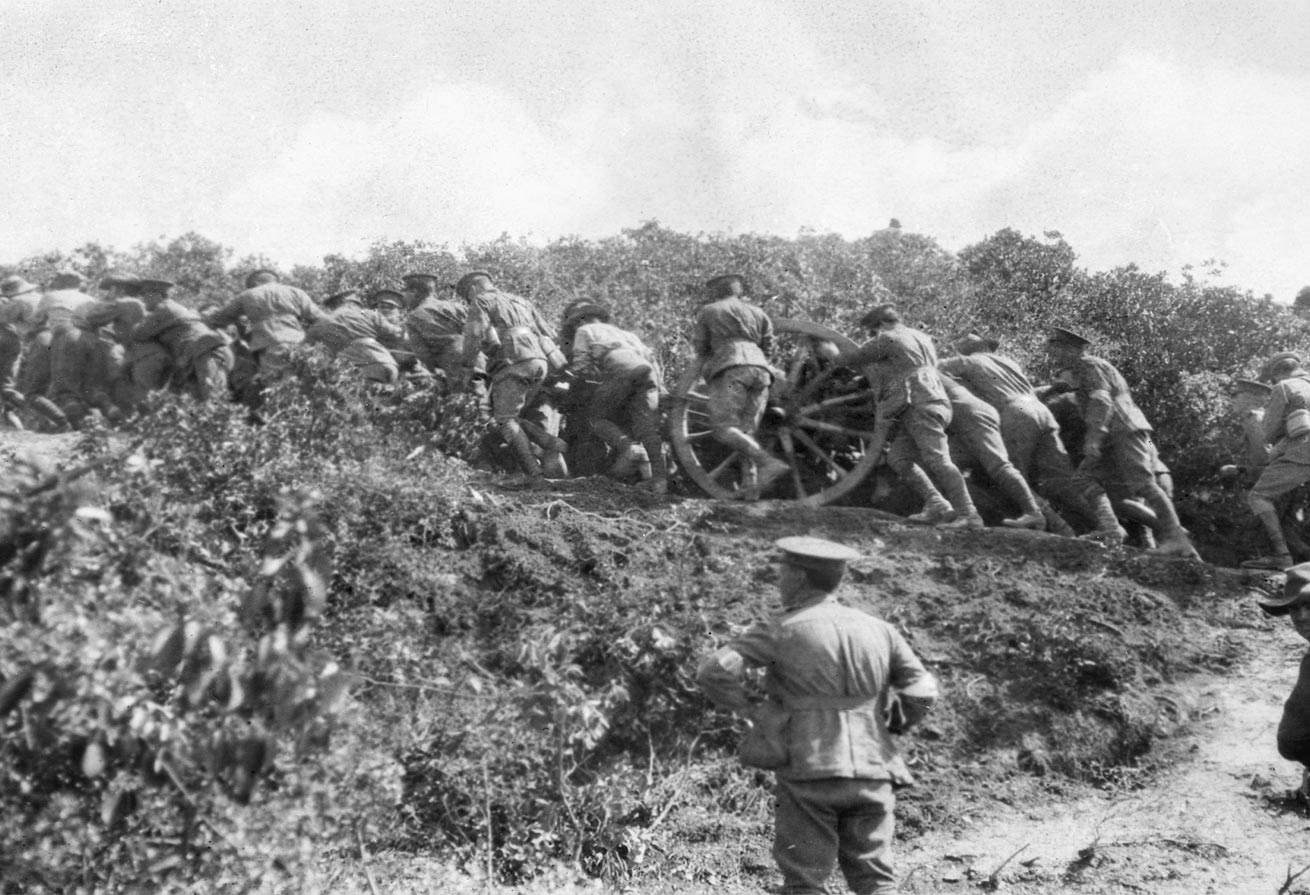

The Victoria Cross was introduced in January 1856 by Queen Victoria as the highest decoration for valour available to members of the armed forces from across Britain and the British Empire. Irish-born men, whether serving in Irish, British or other Commonwealth forces have, since 1856, won a total of 180 Victoria Crosses. These have been won in all major wars since the mid-19th century including 30 awarded during the Crimean War, 59 during the Indian Mutiny and 37 during the four years of the First World War.
Of those Victoria Crosses awarded during the 1914-18 period, four were won by Irishmen serving at Gallipoli. The number, given the various acts of courage under enemy fire at Gallipoli, seems low. As a result there have been, ever since 1915, criticisms that the military forces did not recognise Irish acts of heroism at Gallipoli due to the superior attitude of British officers. How far that is true is difficult to say, but it is clear that the numbers of Victoria Crosses awarded to colonial troops at Gallipoli is generally low, with eight Australian recipients and one from New Zealand. Commentators have argued that this small number speaks to the chaos of the campaign and to its ultimate failure.
Born on 12 June 1894 at Belturbet, Co Cavan, James Somers enlisted in the regular army in July 1913. He was part of the British Expeditionary Force in Belgium when war broke out in 1914, and he was wounded in the retreat from Mons. On returning to service after a period of recuperation at his new family home in Cloughjordan, Co Tipperary, Somers retook his position as a sergeant in the 1st Battalion of the Royal Inniskilling Fusiliers. After a short period billeted in Rugby, Warwickshire, the Inniskillings were readied to move to the Dardanelles.
The battalion was sent to Gallipoli, and landed on X beach on 25 April 1915. Somers survived the first few weeks, and once the beach had been secured he regularly took part in trench duty where he faced the Turks. During an attempt to take a Turkish trench on 1 and 2 July 1915, Somers would, because of his courageous actions in the line of fire, win his Victoria Cross. His citation, published on 31 August 1915, stated: ‘For most conspicuous bravery on the night of 1st-2nd July, 1915, in the Southern Zone of the Gallipoli peninsula, when, owing to hostile bombing, some of our troops had retired from a sap, Sergeant Somers remained alone on the spot until a party brought up bombs. He then climbed over into the Turkish trench, and bombed the Turks with great effect. Later on he advanced into the open under very heavy fire and held back the enemy by throwing bombs into their flank until a barricade had been established. During this period he frequently ran to and from our trenches to obtain fresh supplies of bombs. By his great gallantry and coolness Sergeant Somers was largely instrumental in effecting the recapture of a portion of our trench which had been lost.’
After leaving Gallipoli in September 1915, Somers travelled home. He was awarded his Victoria Cross at Buckingham Palace on 14 October 1915. He was afforded a civic reception on his return to Cloughjordan, and presented with a cheque for £300. During the autumn of 1915 he was toured around Ireland, including parts of Ulster, as part of a recruitment drive. He was a guest at the Glentoran vs Distillery soccer match on 18 October, where he told the crowd: ‘That’s the place for you boys [the recruiting office], and then the battlefield and if you have to die on the field of honour you will die a glorious death for your country, for freedom and liberty.’
He would later return to service and fight in France where he was gassed in 1917. He was invalided home to Cloughjordan where he died on 7 May 1918 from the effects of the gas. He was buried with full military honours at the Modreeny Church of Ireland Cemetery.
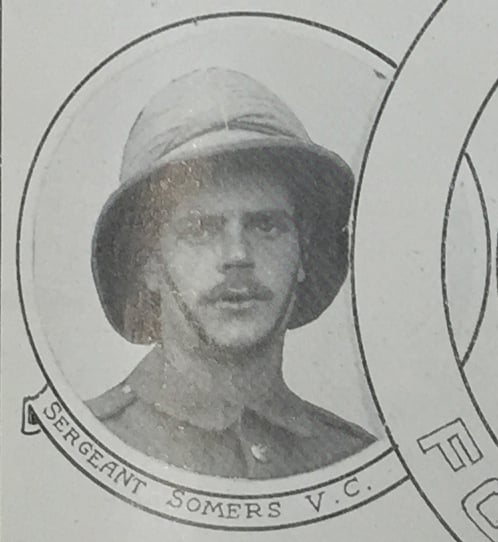
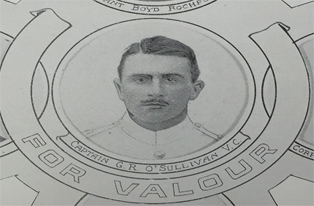
Born in Douglas, Co Cork, on 8 November 1888, O’Sullivan was destined for a military career. His father had spent his career in the Highlanders, and O’Sullivan duly graduated from school in 1906 and subsequently attended the Royal Military Academy at Sandhurst. After successfully charting his three years at Sandhurst, O’Sullivan was commissioned as an officer in the Royal Inniskilling Fusiliers in 1909. In the years before the war, O’Sullivan served in China before a posting to India where he was stationed when hostilities broke out in 1914.
The Inniskillings were returned to England in early 1915 and prepared for transfer to the Dardanelles. As a captain of the 1st Battalion, O’Sullivan led his men ashore on the first day of the Gallipoli campaign at X Beach. In June, O’Sullivan led his men in a vital attack to reclaim trenches that had been taken by the Turks which, after a night of fighting, they managed to do by the following morning. On 1 and 2 July O’Sullivan was involved in fighting at Krithia, where he was again sent out to reclaim a trench that had been taken by the enemy. The trench was well fortified and the only possibility for an attack was a direct, full frontal assault on the Turkish positions. O’Sullivan led a party of bomb throwers and exposed himself to the Turks before throwing his bombs. In such an exposed position he was shot a number of times and wounded, but his actions led to a successful retaking of the trench.
It was for this action that O’Sullivan received his Victoria Cross. The citation for his award, published 1 September 1915, read: ‘For most conspicuous bravery during operations south-west of Krithia, on the Gallipoli peninsula. On the night of the 1st - 2nd July 1915, when it was essential that a portion of a trench which had been lost should be regained, Captain O’Sullivan, although not belonging to the troops at this point, volunteered to lead a party of bomb throwers to effect the recapture. He advanced in the open under a very heavy fire, and, in order to throw his bombs with greater effect, got up on the parapet where he was completely exposed to the fire of the enemy occupying the trench. He was finally wounded, but not before his inspiring example had led on his party to make further efforts, which resulted in the recapture of the trench.'
O’Sullivan was sent away from Gallipoli to Egypt to recover. His treatment was successful and he was back on the peninsula by 11 August 1915. By the time of his return the Inniskillings were involved in the campaign at Suvla Bay. On 21 August he led 50 of his men in an attack on Turkish positions at Hill 70, but was killed as he advanced. He died alongside 48 of his men, with only one injured sergeant returning from the deadly assault.
The body of O’Sullivan was never recovered and he is commemorated on the Helles Memorial.
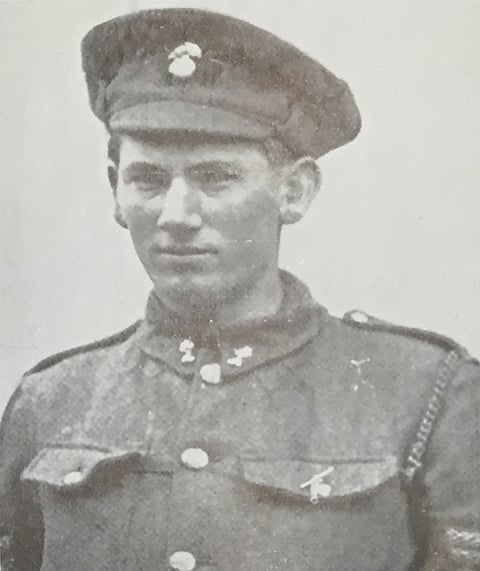
Born at Aghada, County Cork on 1 October 1888, William Cosgrove was one of six children. After leaving school he began work as an apprentice butcher. He joined the Royal Munster Fusiliers in March 1909, and was stationed in India and Burma in the years before the First World War.
With the outbreak of the war the Fusiliers were returned from Burma to London in January 1915. After a period of preparation the Fusiliers were transferred to the Dardanelles in readiness for the Gallipoli landings. Cosgrove, with his fellow Munsters, went ashore on 25 April 1915 from the SS River Clyde. Cosgrove survived the first day of the campaign, and on the second was sent ashore to destroy the barbed wire that was slowing the advance of troops across the beach. Finding the Turkish barbed wire too strong for his wire clippers, and under heavy fire, Cosgrove began tearing the stakes that held the barbed wire out from the sand. In doing this Cosgrove cleared a way that allowed allied troops to advance and secure the beach. During his efforts Cosgrove was shot by a machine gun, and would eventually be hospitalised because of his injuries. They were so serious that he took no further part in the war. The award of the Victoria Cross was gazetted on 23 August, 1915, stating: 'For most conspicuous bravery leading this section with great dash during our attack from the beach to the east of Cape Helles on the Turkish positions on April 26th, 1915. CPL Cosgrove on this occasion pulled down the posts of the enemy’s high wire entanglements single-handed, notwithstanding a terrible fire from both front and flank, thereby greatly contributing to the successful clearing of the heights.' He was invested with his medal by King George V at Buckingham Palace on 4 November 1916.
After the war he served as an instructor to the Indian Territorial Force. In 1935 he retired from the army and returned home. He would die a year later on 21 July 1936 due, in part, from the injuries he had received at Gallipoli. He was buried with full military honours at the Upper Aghada Cemetery, Cork.
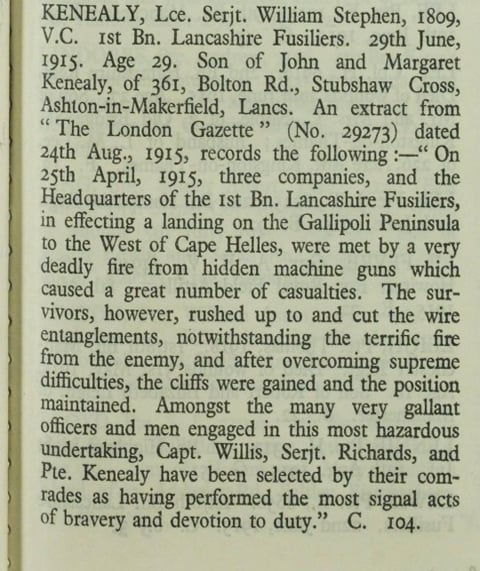
Born on Parnell Street, Wexford on 26 December 1886, William Kenealy moved as a young child to Lancashire where his father found work in a local colliery. Kenealy followed his father to the pit, and began working underground at the age of 13. At the age of 23 he joined the Lancashire Fusiliers as a private. Kenealy and the Lancashire Fusiliers were moved to Turkey in readiness for the Gallipoli landings. On 25 April 1915, 1,000 men of the Lancashires landed at W Beach. The Beach was well defended by the Turks, and of the first 200 men who landed, only 21 survived. Despite the numbers falling around him, Kenealy survived the landings and weeks later was involved in intense fighting as the battle moved inland and allied forces attempted to take further Turkish positions. Kenealy was mortally wounded during the Battle of Gully Ravine on 28 June 1915.
Kenealy’s Victoria Cross, one of six awarded to the Lancashire Fusiliers for their actions on the landing day of 25 April 1915, was awarded on the recommendation of the battalion’s commanding officer, Major Bishop. The citation, which is the same for all six men, reads: ‘On the 25th April, 1915, headquarters and three companies of the 1st Battalion, Lancashire Fusiliers in effecting a landing on the Gallipoli peninsula to the west of Cape Helles, were met by very deadly fire from hidden machine guns, which caused a great number of casualties. The survivors, however, rushed up to and cut the wire entanglements, notwithstanding the terrific fire from the enemy, and after overcoming supreme difficulties, the cliffs were gained and the position maintained. Amongst the many very gallant officers and men engaged in this most hazardous undertaking, Captain Bromley, Sergeant Stubbs, Corporal Grimshaw, Private Kenealy, Sergeant Richards and Captain Willis have been selected by their comrades as having performed the most signal acts of bravery and devotion to duty.’
Kenealy died of his wounds at a field hospital in Gully Ravine at Gallipoli in 29 June 1915 and is buried at the Lancashire Landing Cemetery in Gallipoli. His Victoria Cross was announced on 24 August 1915, and his parents collected the award from King George V at Buckingham Palace on 29 November 1916.